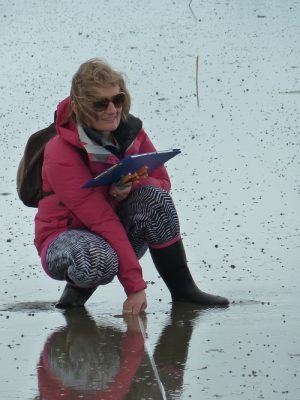Fairhaven School – Delwyn Weaver

2016 | Marine scientists at work in the Western Bay
School: Fairhaven School
Host: Coastal Marine Field Station, University of Waikato
Region: Bay of Plenty
Fairhaven School has made a commitment to improving science learning for its students by enabling two teachers, Delwyn Weaver and Ange McAllister to participate in the STLP programme during the second part of this year. These teachers have promoted science teaching and learning in the school over the last two years. The school aims to build a strong science leadership team that will help to improve the school’s teacher knowledge and understanding of the Nature of Science and to develop quality science programmes for it’s learners. Another goal is to develop science at a wider level in the community through the network of local schools.
Delwyn has many years of teaching experience, predominantly in the junior area but more recently in year 4 where she is currently the Pod Leader. Delwyn has a strong interest in science and encouraged the school to become involved in the House of Science which provides science professional development and resource kits. Her other passions are literacy and numeracy. She sees integrating the sciences with literacy and numeracy as a means of creating strong, practical, authentic learning experiences.
Delwyn has been working at the Coastal Marine Field Station in Tauranga on a diverse range of marine research. During her time at the Field Station, she has had opportunities to work alongside the scientists and students, ask questions, observe and assist wherever possible both in the field and at the field station.
Some of her experiences include:
- Observing and working alongside scientists investigating the impact of the MV Rena grounding on the habitats and species on the Astrolabe Reef. A highlight was the field trips out to the reef with the divers.
- Supporting a scientist monitoring the feeding behaviour and seasonal movement of stingray in the Tauranga Harbour by helping to trial different sampling methods and identifying and counting stingray pits in the field.
- Assisting scientists to take samples of sediment in the harbour, then counting and measuring the pipi to assess the effect of dredging for the port on the pipi beds. Also she helped collect samples and take video footage of areas behind Rabbit Island where the sediment was dumped.
- Contributing to an educational programme for school students called “A day in the life of a marine scientist”.
Over phase one, Delwyn has gained a firm knowledge and understanding of the purposes of science education in the curriculum, the Nature of Science strand and the Science Capabilities. She has developed her own scientific knowledge and understanding of how scientists work. Many valuable connections have been made with the science community. Delwyn has learned strategies for leading development of science at Fairhaven School.
Delwyn would like to thank her host, Phil Ross, and the scientists and students for warmly welcoming her at the Coastal Marine Field Station. They have generously shared their time, knowledge and interests with her and included her in many practical experiences.
The Royal Society of New Zealand has provided Delwyn with an amazing opportunity for personal and professional development through the Science Teaching Leadership Programme. It has been an incredible experience.
